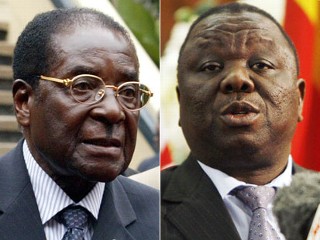Sliver of light in Zimbabwe's long night: unity deal agreed
 Johannesburg/Harare - After a decade-long political and economic crisis in Zimbabwe, Africa's "sinking Titanic" - as Zambia's deceased president Levy Mwanawasa once called his neighbouring country - was headed for shore Thursday as the 28-year stranglehold on power of President Robert Mugabe was finally prised loose.
Johannesburg/Harare - After a decade-long political and economic crisis in Zimbabwe, Africa's "sinking Titanic" - as Zambia's deceased president Levy Mwanawasa once called his neighbouring country - was headed for shore Thursday as the 28-year stranglehold on power of President Robert Mugabe was finally prised loose.
In an historic development, South African President Thabo Mbeki announced that the authoritarian octogenarian had agreed to a deal to share control of Zimbabwe with his arch-rival, Movement for Democratic Change (MDC) leader Morgan Tsvangirai, whom Mugabe has long disparaged as a puppet of the West.
Although details of the agreement have yet to be released, negotiations had centred on a French-style cohabitation agreement, where Mugabe would remain president and Tsvangirai would occupy the resurrected post of prime minister. Mbeki said the deal would be formally announced Monday in the presence of regional heads of state.
The African Union had proposed a unity government, modelled on the arrangement that ended weeks of bloodshed in Kenya, as a solution to Zimbabwe's protracted political and economic crisis.
The deal came at the end of four days of talks in Harare that followed on several previous aborted attempts by Mbeki to bridge the differences between Mugabe and Tsvangirai on how to divvy up power.
Tsvangirai had been demanding full control of government, while Mugabe had been insisting he retain significant powers on the basis of his controversial victory in one-man presidential run-off elections in June.
Tsvangirai won the first round of voting for president, but garnered too few votes for an outright victory. He boycotted the run- off over a spate of state-sponsored killings of his supporters.
Mbeki reportedly brought new proposals to the table on Monday, including a proposal that the two men share control of cabinet. The duration of the unity government had been another major sticking point. The MDC had been called for a transitional authority leading to new elections, while Mugabe was insisting on a full-term government.
Tsvangirai had been under pressure from his supporters and from Western powers that back the MDC not to cave in to pressure within southern Africa to accept a junior partnership under Mugabe.
It remained to be seen whether the deal agreed upon would strip Mugabe of enough powers to please Britain, the United States and other countries that have pledged to plough money into Zimbabwe's reconstruction, but only if Tsvangirai and the MDC wield real power.
Whatever the deal, it will give the MDC its first real taste of power since it was founded nine years ago in response to Mugabe's growing authoritarianism.
But observers have predicted a bumpy road for any government comprising the longtime foes.
Many MDC members are still nursing injuries, both physical and psychological, after being repeatedly harassed, detained and even beaten by state forces over the past eight years.
Since March, scores of party supporters have been killed by Mugabe supporters and thousands forced from their homes.
Mugabe got a taste of the MDC's anger first-hand when he opened parliament last month to deafening jeers.
Thursday's agreement is above all a triumph for Mbeki on the eve of his exit from power at the end of two terms next year.
Mbeki's nine years of "quiet diplomacy" in Zimbabwe had often been pilloried as biased towards Mugabe and ineffective.
In the end, it was the rock-bottom state of Zimbabwe's economy that drove a reluctant Mugabe to the negotiating table. With inflation running at 11.2 million per cent and food in critically short supply, Mugabe is counting on the Western-backed MDC to act as a magnet for much-needed foreign aid and investment.
In an interview with Deutsche Presse-Agentur dpa in February, Tsvangirai estimated "at least 5 to 10 billion dollars" would be needed to turn around the world's fastest shrinking economy.
The Zimbabwean government will also be looking to woo back some of the between 2 and 3 million Zimbabweans who have fled the country over the past decade, taking with them precious skills. (dpa)